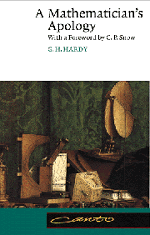Summary
THESE distinctions between pure and applied mathematics are important in themselves, but they have very little bearing on our discussion of the ‘usefulness’ of mathematics. I spoke in § 21 of the ‘real’ mathematics of Fermat and other great mathematicians, the mathematics which has permanent aesthetic value, as for example the best Greek mathematics has, the mathematics which is eternal because the best of it may, like the best literature, continue to cause intense emotional satisfaction to thousands of people after thousands of years. These men were all primarily pure mathematicians (though the distinction was naturally a good deal less sharp in their days than it is now); but I was not thinking only of pure mathematics. I count Maxwell and Einstein, Eddington and Dirac, among ‘real’ mathematicians. The great modern achievements of applied mathematics have been in relativity and quantum mechanics, and these subjects are, at present at any rate, almost as ‘useless’ as the theory of numbers. It is the dull and elementary parts of applied mathematics, as it is the dull and elementary parts of pure mathematics, that work for good or ill. Time may change all this. No one foresaw the applications of matrices and groups and other purely mathematical theories to modern physics, and it may be that some of the ‘highbrow’ applied mathematics will become ‘useful’ in as unexpected a way; but the evidence so far points to the conclusion that, in one subject as in the other, it is what is commonplace and dull that counts for practical life.
- Type
- Chapter
- Information
- A Mathematician's Apology , pp. 131 - 133Publisher: Cambridge University PressPrint publication year: 1992

